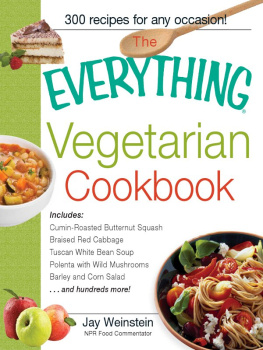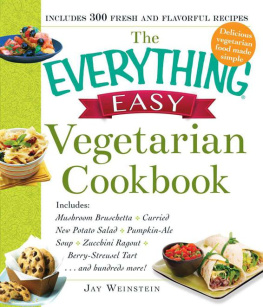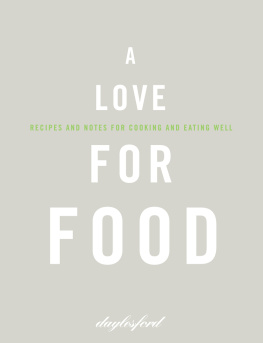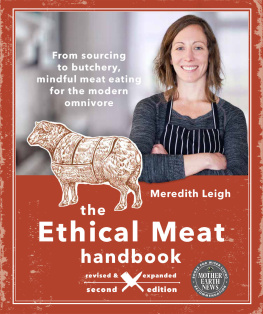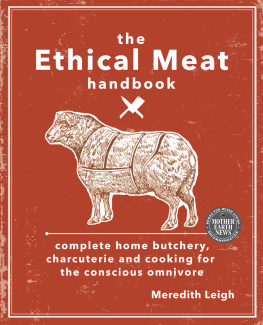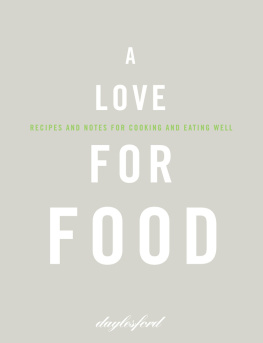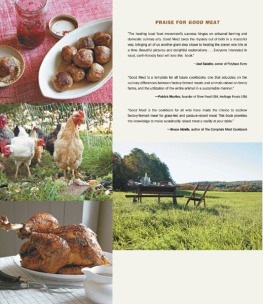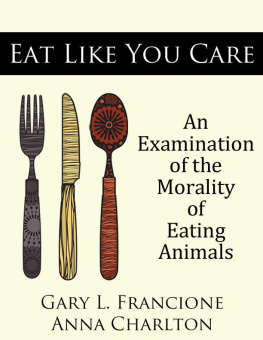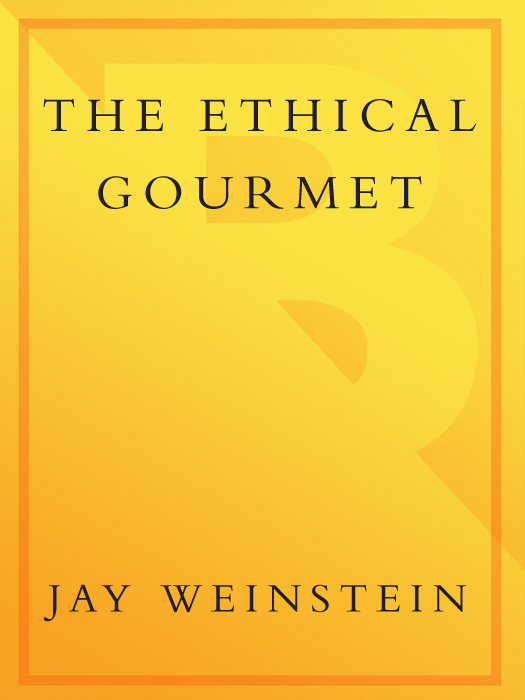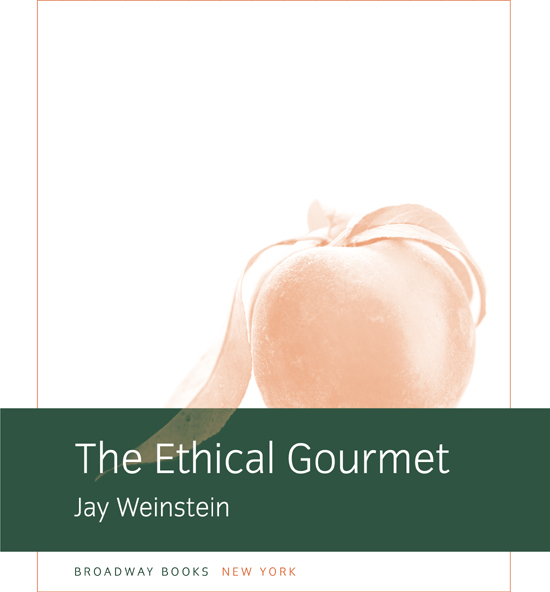ALSO BY JAY WEINSTEIN
A Cup of Comfort Cookbook: Favorite Comfort Foods
to Warm Your Heart and Lift Your Spirit
The Everything Vegetarian Cookbook:
300 Healthy Recipes Everyone Will Enjoy
THIS BOOK IS DEDICATED, WITH LOVE AND RESPECT, TO MY PARENTS.
Contents
Acknowledgments
Thanks to my father, Seymour Weinstein, whose support, advice, research, and encouragement were indispensable in the writing of this book. Special thanks to my partner, Tuan Pu Wang, for keeping me focused on the task at hand and smoothing the rough places in the road. Thanks to Jacques de Spoelberch, a true gentleman, without whom this book would never have seen the light of day. Thanks to Jennifer Josephy, whose thoughtful guidance helped me refine rough concepts into finished thoughts. Thanks to Lucy Cohen, for her help with my research.
Chefs at the Culinary Institute of America and elsewhere, including Hinnerk von Bargen, Anna and David Kasabian, David Kamen, Kathryn Matthews, and Veronica Arcoraci, worked hard in the kitchen, testing and refining the recipes contained here. Thanks to my friends John Carroll and Mary Palermo, Josh Martin, James Moses, Rebecca Freedman, Douglas Clark, Momo Attaoui, Kevin Mulcahy, and Eric Svenson and to my sister, Naomi Dreeben, for their contributions, including hundreds of essential news clippings.
Numerous great chefs, especially Jasper White, instilled in me a respect for ingredients with integrity, for which I am eternally grateful. Thanks to Tim Cole and Diane Muhlfeld for giving me the latitude to work on this project. And thanks to the scientists, environmentalists, culinarians, and ethical consumers who are making the world a better place through their actions.
Introduction
Were at a turning point in the history of American food production, when a reborn ethicthat were responsible for the way we treat the land and its bountyis changing what we see on our supermarket shelves and dinner plates.
Flavor, freshness, and overall quality of food are rising. Its easier than ever to buy ingredients that dont despoil the environment, exploit endangered wildlife, or create undue suffering in the world.
We have all heard of the rain forests that are continually disappearing, the rivers that are being polluted, and the acid rain that is harming our very being. But most of us are so overwhelmed by the magnitude of the problems that we just throw up our hands when it comes to trying to help solve them. This book is written in the belief that if each of us does his or her part we can make a difference, and the world will be a better place for it.
These pages feature more than a hundred recipes that showcase mainstream organic fruits and vegetables and ethically raised products. A combination lifestyle guide, shoppers resource, and cookbook, this book brings together the concepts, sources, and methods for enjoying todays conscientiously raised harvest.
The age of the industrial organic farm has arrived. While bad news for some small organic farmers, its a boon for the ethical gourmet. Agribusiness, armed with the Food and Drug Administrations new organic labeling law, is undercutting mom and pop in the pesticide-free, naturally fertilized food market. Quality organic and environmentally sensitive food products are going mainstreamavailable in supermarkets and other food stores throughout the United States and abroad.
The vast majority of Americans identify themselves as environmentalists. If they had a choice, they would choose fish from nonendangered stocks, produce whose growth doesnt pollute the land and waterways, and pork from pigs that led a good life. Every recipe in this book is based on that assumption: People do the right thing if all else is equal. Heres a way to put beliefs into practice.
Whole grains used to be hard to find. They can replace meats nutritional role if you can find them. Now, supermarkets carry wheat berries and quinoa. Even if yours doesnt, this book will tell you where to get them easily. Youll learn to recognize brand names of humanely raised meat and poultry you can trust, names of endangered fish and game species youll want to avoid (even though theyre cheap and widely available), and produce you know is grown right, even if its from a factory farm.
With the endangered status of wild edibles constantly in flux, its more important than ever to know the causes of species loss and the types of harvesting that wound the ecosystem. With the help of this book, savvy consumers will be able to assess for themselves the impact they make with each purchase.
No matter what the organic moralists tell you, theres no credible evidence that organic foods are any more nutritious than nonorganic foods. But there are good reasons to choose them. Their pesticide-free production causes much less pollution and degradation to the land and water that nourish them. Theyre free from dangerous residues. They also usually taste better. Ditto for humanely raised livestock. This book allows responsible stewards of the Earth to enjoy delicious foods. You can open any page of this cookbook and find recipes that will not make you feel guilty about what youre doing to the sea, air, or land. At the same time, youll be making an unintentionally healthy choice by moving powerful pesticides out of your diet and giving meat an exalted place, rather than an overbearing one, on your menu, as a complement to wholesome grains, vegetables, and legumes.
The recipes come from my years of fine-dining restaurant experience and the Culinary Institute of America (CIA) training built into my repertoire, tempered by my lifelong commitment to the environment, understanding of our food system, and my respect for living things. My independent insight, earned from years of professional buying and cooking, is not driven by producers, but by knowledge, research, and principle.
In the 1980s, my chef and mentor at a New American restaurant in Bostons North End, Jasper White, engaged in the kind of ingredient sourcing that was sweeping the nation, from Alice Waterss Chez Panisse in Berkeley and Mark Millers Coyote Caf in Santa Fe to Paul Prudhommes K-Pauls in New Orleans and Larry Forgiones American Place in New York. They were rejecting the consolidated food suppliers that had arisen in the last half-century, and going back to buying directly from producers. Jasper sourced ingredients from between sixty and seventy companies, large and small, while other, larger restaurants were buying from only six or seven megadistributors. Of course, we had accounts with giant suppliers like Sexton and Sysco, who sold virtually everything from daikon radishes to dish detergent. But Jasper White and his colleagues across America knew that the principles of buying locally, direct from producers, had tangible benefits that were being undermined by the consolidated food distribution system our country had developed since the end of World War II. That conceptconsciously choosing where to buy ingredients rather than always going to the most convenient sellermakes as much sense for the individual as it does for the restaurateur.
We all care about preserving natural beauty, eliminating the suffering of the underprivileged, and treating animals humanely. But to put our money where our mouths are, we have to look beyond the convenience of supermarkets and big box stores some of the time. As the New American restaurant chefs know, there is a place for the big players in food sourcing. But theres also a place for producers who sell direct to the consumer. To know when to buy at Costco and when to buy from a family farm stand, or when to pick up meat at the supermarket versus when to order it over the Internet, read the pages ahead.


